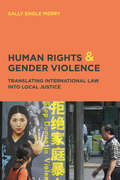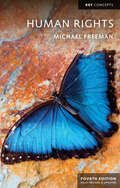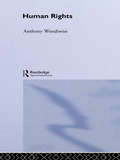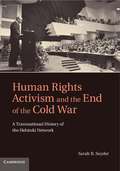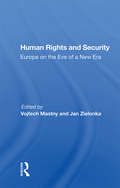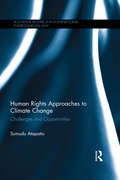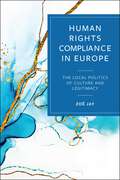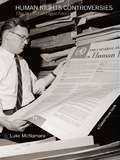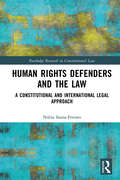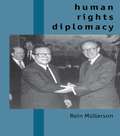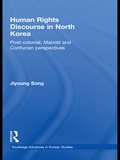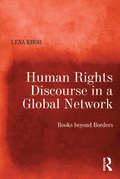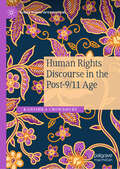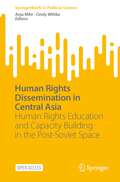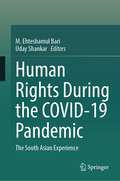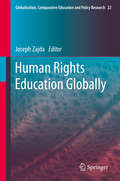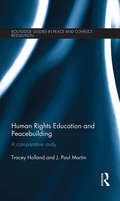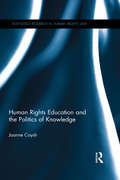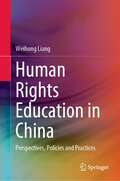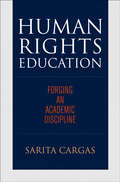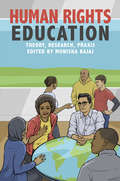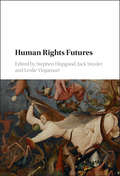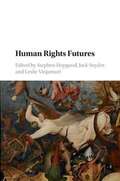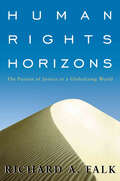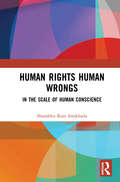- Table View
- List View
Human Rights & Gender Violence: Translating International Law into Local Justice (Chicago Series In Law And Society Ser.)
by Sally Engle MerryHuman rights law and the legal protection of women from violence are still fairly new concepts. As a result, substantial discrepancies exist between what is decided in the halls of the United Nations and what women experience on a daily basis in their communities. Human Rights and Gender Violence is an ambitious study that investigates the tensions between global law and local justice. As an observer of UN diplomatic negotiations as well as the workings of grassroots feminist organizations in several countries, Sally Engle Merry offers an insider's perspective on how human rights law holds authorities accountable for the protection of citizens even while reinforcing and expanding state power. Providing legal and anthropological perspectives, Merry contends that human rights law must be framed in local terms to be accepted and effective in altering existing social hierarchies. Gender violence in particular, she argues, is rooted in deep cultural and religious beliefs, so change is often vehemently resisted by the communities perpetrating the acts of aggression. A much-needed exploration of how local cultures appropriate and enact international human rights law, this book will be of enormous value to students of gender studies and anthropology alike.
Human Rights (Key Concepts)
by Michael FreemanHuman Rights, now in its fourth edition, is an introductory text that is both innovative and challenging. Its unique interdisciplinary approach invites students to think imaginatively and rigorously about one of the most important and influential political concepts of our time. Tracing the history of the concept, the book shows that there are fundamental tensions between legal, philosophical and social-scientific approaches to human rights. This analysis throws light on some of the most controversial issues in the field: What are the causes of human-rights violations? Is the idea of universal human rights consistent with respect for cultural difference? Are we living in a ‘post-human rights’ world? Thoroughly revised and updated, the new edition engages with recent developments, including the Trump and Biden presidencies, colonial legacies, neoliberalism, conflict in Syria, Yemen and Myanmar, the Covid-19 pandemic, new technologies and the supposed crisis of liberal democracy. Widely admired and assigned for its clarity and comprehensiveness, this book remains a ‘go-to’ text for students in the social sciences, as well as students of human-rights law who want an introduction to the non-legal aspects of their subject.
Human Rights (Key Ideas)
by Anthony WoodiwissAre human rights part of the problem or part of the solution in the current 'clash of civilizations'? Drawing on a hitherto neglected body of work in classical social theory and combining it with ideas derived from Barrington Moore, Norbert Elias and Michel Foucault, Woodiwiss poses and answers the questions: How did human rights become entangled with power relations? How might the nature of this entanglement be altered so that human rights better serve the global majority? In answering these questions, he explains how and why rights discourse developed in such distinctive ways in four key locations: Britain, the United States, Japan and in the UN. On this basis he provides, for the first time, a general sociological account of the development of international human rights discourse, which represents a striking challenge to current thinking and policy.
Human Rights Activism and the End of the Cold War
by Sarah B. SnyderTwo of the most pressing questions facing international historians today are how and why the Cold War ended. Human Rights Activism and the End of the Cold War explores how, in the aftermath of the signing of the Helsinki Final Act in 1975, a transnational network of activists committed to human rights in the Soviet Union and Eastern Europe made the topic a central element in East-West diplomacy. As a result, human rights eventually became an important element of Cold War diplomacy and a central component of détente. Sarah B. Snyder demonstrates how this network influenced both Western and Eastern governments to pursue policies that fostered the rise of organized dissent in Eastern Europe, freedom of movement for East Germans and improved human rights practices in the Soviet Union - all factors in the end of the Cold War.
Human Rights And Security: Europe On The Eve Of A New Era
by Jan Zielonka Vojtech MastnyInquiries into the relationship between security and human rights are of very recent vintage. They have long been hampered by political scientists' predilection for political "realism." From that perspective, there seemed little doubt that power comes first and any human rights but a poor second. As wishful thinking turned into reality during the Eastern European revolutions of 1989, the limitations of such shortsighted realism became apparent. This book examines the causes and consequences of the emerging new relationship between security and human rights. It is divided into two parts, which deal respectively with security and human rights and their relationship to states and societies. What is the theoretical linkage between security and human rights? How has this linkage evolved within the context of East-West relations? What was the particular role of the Helsinki process in shaping this evolution? How do these issues affect the difficult transition from dictatorship to pluralism in countries facing the challenge of ethnic, economic, and social dislocation? The contributors to this volume seek to deepen our understanding of the forces that brought about the collapse of communism in Europe, and they explore the broader implications of change for the emerging post-cold war international order.
Human Rights Approaches to Climate Change: Challenges and Opportunities (Routledge Research in International Environmental Law)
by Sumudu AtapattuDespite the clear link between climate change and human rights with the potential for virtually all protected rights to be undermined as a result of climate change, its catastrophic impact on human beings was not really understood as a human rights issue until recently. This book examines the link between climate change and human rights in a comprehensive manner. It looks at human rights approaches to climate change, including the jurisprudential bases for human rights and the environment, the theoretical framework governing human rights and the environment, and the different approaches to this including benchmarks. In addition to a discussion of human rights implications of international environmental law principles in the climate change regime, the book explores how the human rights framework can be used in relation to mitigation, adaption, and adjudication. Other chapters examine how vulnerable groups –women, indigenous peoples and climate "refugees" – would be disproportionately affected by climate change. The book then goes on to discuss a new category of people created by climate change, those who will be rendered stateless as a result of states disappearing and displaced by climate change, and whether human rights law can adequately address these emerging issues.
Human Rights Compliance in Europe: The Local Politics of Culture and Legitimacy
by Zoë JayThe European Court of Human Rights depends on the good faith cooperation of its members to implement judgement and maintain legitimacy, but how this translates into compliance varies both across and within states. This book presents an innovative framework for understanding how local cultures dynamically shape states’ ideas about what is and is not legitimate in international human rights regimes. The book investigates compliance as a product of cultural politics. Case studies from the United Kingdom, Germany, and Croatia reveal how states rely on local understanding of human rights and law to deal not only with compliance ‘sticking points’ but also to evaluate the legitimacy of the European human rights system as a whole.
Human Rights Controversies: The Impact of Legal Form
by Luke McNamaraMany countries confront similar human rights controversies, but, despite the claimed universality of human rights values they are not always resolved in the same way. Why? What role do local legal conditions play? Is human rights discourse more potent where rights are constitutionally entrenched, rather than where there is a tradition of respect for underlying human rights values but no bill of rights? Comparative socio-legal examination of three recent controversies - double jeopardy reform, recognition of same-sex relationships and the operation of hate speech laws - in four countries - Australia, Canada, New Zealand and the United Kingdom provides answers to these questions. Examination of these controversies suggests that differences in the design of domestic legal institutions and procedures for the injection of human rights values into legal decision-making processes can have a powerful effect on the manner in which human rights issues are constructed, handled and resolved.
Human Rights Defenders and the Law: A Constitutional and International Legal Approach (Routledge Research in Constitutional Law)
by Núria Saura-FreixesThis book presents a comprehensive examination of the Declaration on Human Rights Defenders and provides an analysis of the level of its reflection in regional human rights systems. The work explores the development of the role of the individual in human rights protection since the 1998 United Nations Declaration on Human Rights Defenders. It locates the nature, activities and need for protection of human rights defenders within the current international legal framework and outlines the place and scope for a specific right to promote and protect human rights. It traces the origins of the right and the main international instruments that define it, both at national and international level. Finally, it considers the impact that the right to defend human rights can have on constitutional and international law. The book will be a valuable resource for academics and researchers working in the areas of International Human Rights Law and Constitutional Law.
Human Rights Diplomacy
by Rein MullersonIn this insightful analysis of human rights diplomacy Rein Mullerson examines the way foreign policy instruments are used to promote human rights abroad as well as how human rights issues are used for the sake of other foreign policy aims.The book explores the relationship between human rights and international stability, the role of non-governmental organisations, the business community and mass media in formulating human rights agendas for governments and inter-governmental organisations. Also addressed are issues such as the universality of human rights in a multi-cultural world and the impact of religious and nationalistic extremism. Rein Mullerson concludes by looking at the role of the UN and other international bodies engaged in the promotion of human rights and how military force can be an option in settling violationsThe author argues that it tends to be regimes that are hostile to human rights which in turn cause instability in the international community. Throughout the work it is demonstrated that a concern for human rights is legitimate because of the impact they have on international relations and because of the common bonds that link all people.
Human Rights Discourse in North Korea: Post-Colonial, Marxist and Confucian Perspectives (Routledge Advances in Korean Studies)
by Jiyoung SongThis unique book examines the conceptual development of human rights in North Korea from historical, political and cultural perspectives. Dr Jiyoung Song explains how North Korea has understood the concepts of human rights in its public documents since its independence from Japan in 1945. Through active campaigns and international criticism, foreign governments and non-governmental organisations outside North Korea have made numerous allegations of human rights violations. On the other hand, the efforts to engage with North Korea in order to improve the human rights situation through humanitarian assistance and to understand how North Koreans interpret human rights are often overshadowed by "naming and shaming" and "push-until-it-collapses" approaches. Using close readings and analyses of the collected works of Kim Il Sung and Kim Jong Il, North Korea’s official newspaper, Rodong Sinmun, as well interviews with North Korean defectors and diplomats in South Korea, China and Europe, Dr Song gives thought-provoking and highly debatable accounts for the historically post-colonial, politically Marxist and culturally Confucian elements of North Korean rights thinking. As a piece of research on a nation shrouded in mystery this book will be essential reading for anyone researching human rights issues, Asian politics and international relations.
Human Rights Discourse in a Global Network: Books beyond Borders
by Lena KhorIn her innovative study of human rights discourse, Lena Khor takes up the prevailing concern by scholars who charge that the globalization of human rights discourse is becoming yet another form of cultural, legal, and political imperialism imposed from above by an international human rights regime based in the Global North. To counter these charges, she argues for a paradigmatic shift away from human rights as a hegemonic, immutable, and ill-defined entity toward one that recognizes human rights as a social construct comprised of language and of language use. She proposes a new theoretical framework based on a global discourse network of human rights, supporting her model with case studies that examine the words and actions of witnesses to genocide (Paul Rusesabagina) and humanitarian organizations (Doctors Without Borders). She also analyzes the language of texts such as Michael Ondaatje's Anil's Ghost. Khor's idea of a globally networked structure of human rights discourse enables actors (textual and human) who tap into or are linked into this rapidly globalizing system of networks to increase their power as speaking subjects and, in so doing, to influence the range of acceptable meanings and practices of human rights in the cultural sphere. Khor’s book is a unique and important contribution to the study of human rights in the humanities that revitalizes viable notions of agency and liberatory network power in fields that have been dominated by negative visions of human capacity and moral action.
Human Rights Discourse in the Post-9/11 Age (Human Rights Interventions)
by Kanishka ChowdhuryThis book offers a materialist critique of mainstream human rights discourse in the period following 9/11, examining literary works, critical histories, international declarations, government statutes, NGO manifestos, and a documentary film. The author points out some of the contradictions that emerge in contemporary rights language when material relations are not sufficiently perceived or acknowledged, and he directs attention to the role of some rights talk in maintaining and managing the accelerated global project of capital accumulation. Even as rights discourse points to injustices—for example, injustices related to labor, gender, the citizen’s relationship to the state, or the movement of refugees—it can simultaneously maintain systems of oppression. By constructing subjects who are aligned to the interests of capital, by emphasizing individual “empowerment,” and/or by containing social disenchantment, it reinforces the process of wealth accumulation, supports neoliberal ideologies, and diminishes the possibility of real transformation through collective struggle.
Human Rights Dissemination in Central Asia: Human Rights Education and Capacity Building in the Post-Soviet Space (SpringerBriefs in Political Science)
by Anja Mihr Cindy WittkeThis open access book explores the field of human rights dissemination in Central Asia. Offering a comparative perspective on five post-Soviet Central Asian states—Kazakhstan, Kyrgyzstan, Uzbekistan, Turkmenistan, and Tajikistan, it examines compliance with international human rights standards in these countries. The contributions capture various aspects of human rights dissemination through educational programs, seminars, training, and empowerment programs at Central Asian universities, together with Central Asian NGOs/CSOs and international organizations. The book shows that a change of behavior among state and non-state actors in the region can only happen when both local and international actors, usually international donors, jointly take action to report, train, and empower people in human rights. This book is an invitation to anyone interested in the (troubled) nexus between international human rights norms and standards and their implementation on the local level, as well as in the effective empowerment of citizen in the region.
Human Rights During the COVID-19 Pandemic: The South Asian Experience
by M. Ehteshamul Bari Uday ShankarThis book sheds light on the fact that the proclamation of an emergency can be a legitimate constitutional method to take prompt preventative measures in protecting the interests of the society in times of grave crises. However, the exercise of emergency powers should not undermine a nation’s commitment to democratic values, such as maintaining the rule of law and upholding fundamental human rights. The COVID-19 pandemic has posed grave threats to the lives and health of individuals. However, since the constitutions of South Asian nations do not permit the proclamation of an emergency on health grounds, executives of these nations were constrained to rely, among other things, on ordinary legislation to tide over the threats posed by the pandemic. Although these statutes entrust the executive with extensive emergency powers, they do not simultaneously stipulate any safeguards subjecting the exercise of such powers to a reliable system of checks and balances. Accordingly, this book critically examines the exercise of emergency powers in the South Asian nations to tide over threats posed by the COVID-19 pandemic, which had a profoundly adverse impact on the human rights of individuals. Such exercise of powers was consistent with the general tendency demonstrated by succeeding generations of the executives in these nations to use emergency situations as the convenient means for imposing long-lasting limitations on the rights of individuals. Consequently, this book identifies the flaws, deficiencies, and lacunae of the legal framework in these nations, which permit the executive to assume unfettered power in the exercise of emergency measures at the expense of the liberty of individuals. Consequently, based on these findings, recommendations will be put forward for initiating reforms in these nations aimed at ensuring the maintenance of a delicate balance between the necessity to respond tograve threats and to simultaneously prevent undue intrusion on the fundamental human rights of individuals.
Human Rights Education Globally (Globalisation, Comparative Education and Policy Research #22)
by Joseph ZajdaThis book presents a comprehensive overview of selected research concerning global and comparative trends in dominant discourses on human rights education. Using diverse paradigms, ranging from critical theory to historical-comparative research, the book examines major human rights education reforms and policy issues in a global culture with a focus on the ambivalent and problematic relationship between human rights education discourses, ideology and the state. Further, it discusses democracy, national identity, and social justice, which are among the most critical and significant factors defining and contextualising the processes surrounding nation-building, identity politics and human rights education globally, and also critiques current human rights education practices and policy reforms, illustrating the shifts in the relationship between the state and human rights education policy.Written by authors from diverse backgrounds and regions, the book examines current developments in research concerning human rights education, and citizenship education globally. As such it enables readers to gain a more holistic understanding of the nexus between nation-state, national identity and human rights education both locally and globally. It also provides an easily accessible, practical yet scholarly insights into international concerns in the field of human rights education in the context of global culture.
Human Rights Education and Peacebuilding: A comparative study (Routledge Studies in Peace and Conflict Resolution)
by Tracey Holland J. Paul MartinThis book assesses the role of human rights education (HRE) in the peacebuilding field. Today, most governments, international organisations and non-governmental organisations recognise the importance of human rights in peace- and democracy-building activities in post-conflict regions. However, compared with other components of peacebuilding, little attention and funding have been given to the cultivation of human rights knowledge and skills within these populations. Almost nothing has been committed to understanding how HRE is best accomplished in such difficult circumstances. Human Rights Education and Peacebuilding demonstrates the promise of HRE programs to help bring about peace within challenging post-conflict contexts. Each chapter of this book (a) identifies the short and medium term impacts of seven different HRE programs on their respective target groups, and (b) provides an analysis of the peculiar local contextual factors that influenced each program’s rationale for human rights education. More specifically, each chapter addresses these critical questions: - How are communities around the world using HRE to help rebuild their lives in the aftermath of an armed conflict? - How does HRE respond local problems and needs? How similar are the human rights impacts in the different projects? - How can we understand the promise and challenges associated with HRE as a component of community peace-building? This book will be of much interest to students of peacebuilding, conflict resolution, human rights, education studies and IR in general.
Human Rights Education and the Politics of Knowledge (Routledge Research in Human Rights Law)
by Joanne CoyshAround the world there are a myriad of NGOs using human rights education (HRE) as a tool of community empowerment with the firm belief that it will help people improve their lives. One way of understanding these processes is that they translate universal human rights speak using messages and symbols which make them relevant to people’s daily lives and culturally resonant. However, an alternative more radical perspective is that these processes should engage individuals in modes of critical inquiry into the ways that that existing power structures maintain the status quo and control not only how we understand and speak about social inequality and injustice, but also act on it. This book is a critical inquiry into the production, distribution and consumption of HRE and how the discourse is constructed historically, socially and politically through global institutions and local NGO practice. The book begins with the premise that HRE is composed of theories of human rights and education, both of which are complex and multifaceted. However, the book demonstrates how over time a dominant discourse of HRE, constructed by the United Nations institutional framework, has come to prominence and the ways it is reproduced and reinforced through the practice of intermediary NGOs engaged in HRE activities with community groups. Drawing on socio-legal scholarship it offers a new theoretical and political framework for addressing how human rights, pedagogy, knowledge and power can be analysed between the global and local by connecting the critical, but well-trodden, theories of human rights to insights on critical pedagogy. It uses critical discourse analysis and ethnographic research to investigate the practice of NGOs engaged in HRE using contextual evidence and findings from fieldwork with NGOs and communities in Tanzania.
Human Rights Education in China: Perspectives, Policies and Practices
by Weihong LiangThe book provides new research highlighting perspectives, perceptions, and practices regarding human rights and human rights education in China. It traces the emergence and evolution of the human rights conception and human rights education from comparative perspectives. China’s deeply embedded philosophical and cultural traditions shed light on its ideas of human rights and human rights education. The efforts to construct an independent and strong nation-state since the mid-to-late nineteenth century fashioned the Chinese thinking of rights and citizenship, and the reciprocal relation between the individual and community/state.With the help of collected data, the book unpacks that the goal-making and content-selection of human rights education in China rely heavily on the provisions given by central authorities; however, the practices have different facets depends on how the people perceive and respond those requirements in the school and classroom contexts. The book concludes by explaining the human rights education in China as a socialization project for citizenship-making, and suggests that China’s doctrine on human rights and human rights education is closely associated with cultural relativization and social construction.Though China is just beginning to develop human rights education in its education systems, this study suggests possible direction for future research. How to live with human rights should be included further in schooling, especially how to infuse human rights education into all aspects of school day-to-day life.
Human Rights Education: Forging an Academic Discipline (Pennsylvania Studies in Human Rights)
by Sarita CargasIn tracing the origins of the modern human-rights movement, historians typically point to two periods: the 1940s, in which decade the Universal Declaration of Human Rights (UDHR) was ratified by the United Nations General Assembly; and the 1970s, during which numerous human rights nongovernmental organizations (NGOs), most notably Amnesty International and Médecins Sans Frontières, came into existence. It was also in the 1970s, Sarita Cargas observes, when the first classes in international human rights began to be taught in law schools and university political science departments in the United States.Cargas argues that the time has come for human rights to be acknowledged as an academic discipline. She notes that human rights has proven to be a relevant field to scholars and students in political science and international relations and law for over half a century. It has become of interest to anthropology, history, sociology, and religious studies, as well as a requirement even in social work and education programs. However, despite its interdisciplinary nature, Cargas demonstrates that human rights meets the criteria that define an academic discipline in that it possesses a canon of literature, a shared set of concerns, a community of scholars, and a methodology.In an analysis of human rights curricula in Australia, Canada, the United Kingdom, and the United States, Cargas identifies an informal consensus on the epistemological foundations of human rights, including familiarity with human rights law; knowledge of major actors including the United Nations, governments, NGOS, and multinational corporations; and, most crucially, awareness and advocacy of the rights and freedoms detailed in the articles of the UDHR. The second half of the book offers practical recommendations for creating a human rights major or designing courses at the university level in the United States.
Human Rights Education: Theory, Research, Praxis
by Nancy Flowers Monisha BajajOver the past seven decades, human rights education has blossomed into a global movement. A field of scholarship that utilizes teaching and learning processes, human rights education addresses basic rights and broadens the respect for the dignity and freedom of all peoples. Since the founding of the United Nations and the adoption of the Universal Declaration of Human Rights in 1948, human rights education has worked toward ensuring that schools and non-formal educational spaces become sites of promise and equity.Bringing together the voices of leaders and researchers deeply engaged in understanding the politics and possibilities of human rights education as a field of inquiry, Monisha Bajaj's Human Rights Education shapes our understanding of the practices and processes of the discipline and demonstrates the ways in which it has evolved into a meaningful constellation of scholarship, policy, curricular reform, and pedagogy. Contributions by pioneers in the field, as well as emerging scholars, constitute this foundational textbook, which charts the field's rise, outlines its conceptual frameworks and models, and offers case studies from Africa, Asia, Latin America, Europe, the Middle East, and the United States. The volume analyzes how human rights education has been locally tailored to diverse contexts and looks at the tensions and triumphs of such efforts.Historicizing human rights education while offering concrete grounding for those who seek entry into this dynamic field of scholarship and practice, Human Rights Education is essential reading for students, educators, researchers, advocates, activists, practitioners, and policy makers.Contributors: Monisha Bajaj, Ben Cislaghi, Nancy Flowers, Melissa Leigh Gibson, Diane Gillespie, Carl A. Grant, Tracey Holland, Megan Jensen, Peter G. Kirchschlaeger, Gerald Mackie, J. Paul Martin, Sam Mejias, Chrissie Monaghan, Audrey Osler, Oren Pizmony-Levy, Susan Garnett Russell, Carol Anne Spreen, David Suárez, Felisa Tibbitts, Rachel Wahl, Chalank Yahya, Michalinos Zembylas.
Human Rights Futures
by Jack Snyder Stephen Hopgood Leslie VinjamuriFor the first time in one collected volume, mainstream and critical human rights scholars together examine the empirical and normative debates around the future of human rights. They ask what makes human rights effective, what strategies will enhance the chances of compliance, what blocks progress, and whether the hope for human rights is entirely misplaced in a rapidly transforming world. Human Rights Futures sees the world as at a crucial juncture. The project for globalizing rights will either continue to be embedded or will fall backward into a maelstrom of nationalist backlash, religious resurgence and faltering Western power. Each chapter talks directly to the others in an interactive dialogue, providing a theoretical and methodological framework for a clear research agenda for the next decade. Scholars, graduate students and practitioners of political science, history, sociology, law and development will find much to both challenge and provoke them in this innovative book.
Human Rights Futures (PDF)
by Jack Snyder Stephen Hopgood Leslie VinjamuriFor the first time in one collected volume, mainstream and critical human rights scholars together examine the empirical and normative debates around the future of human rights. They ask what makes human rights effective, what strategies will enhance the chances of compliance, what blocks progress, and whether the hope for human rights is entirely misplaced in a rapidly transforming world. Human Rights Futures sees the world as at a crucial juncture. The project for globalizing rights will either continue to be embedded or will fall backward into a maelstrom of nationalist backlash, religious resurgence and faltering Western power. Each chapter talks directly to the others in an interactive dialogue, providing a theoretical and methodological framework for a clear research agenda for the next decade. Scholars, graduate students and practitioners of political science, history, sociology, law and development will find much to both challenge and provoke them in this innovative book.
Human Rights Horizons: The Pursuit of Justice in a Globalizing World
by Richard A. FalkIn Human Rights Horizons, one of the world's foremost authorities on human rights and international relations maps out the way to a more just and human global society. Borders are being erased; democracy and capitalism are spreading. The world is rapidly changing, and these changes are opening the door for the promotion of human rights to become and integral part of worldwide politics and law.In his provocative new book, Falk discusses the borderline between the promotion of human rights and the promotion of interventionist and coercive diplomacy. Can the US and the UN find an acceptable balance between unnecessary, protracted violence (Somalia) and simply letting genocide spread (Rwanda)? While looking at specific cases, Falk also sheds important new light on non-Western attitudes toward human rights, the challenge of genocidal politics, the intersection of morality and global security, and the pursuit of international justice. Thoughtful and very accessibly written, Human Rights Horizons clearly presents a path to an original new humanitarian policy for the 21st century.
Human Rights Human Wrongs: In the Scale of Human Conscience
by Shambhu Ram SimkhadaThe Universal Declaration of Human Rights (UDHR) is the best gift of the United Nations and its main human rights organ, the Human Rights Commission to “We, the Peoples of the World”. But that powerful instrument is often rendered powerless by the behaviour of individuals running the institutions and the states, arguably the most powerful institution conceptualised by human mind so far. In the process, the UN comes under serious criticism and its most important organ which helped give the UDHR was dissolved for “failing to live up to its ideals”. Ironically, the same states and their representatives most instrumental in creating the UN institutions, including the Human Rights Commission first but later vilifying it and leading the campaign for its replacement by the Human Rights Council are now once again attacking it as “hypocritical and self-serving organisation that makes a mockery of human rights” and the most powerful member state feels compelled to walk out of the Council. Where does the world, the UN and “we the peoples” stand in the search for greater freedom from want and fear, better enjoyment of dignity and rights?Travelling through an extraordinary journey of life, academic pursuits and expeditions of professional and diplomatic mountain climbing, including the Chairmanship of the 56th Session of the UN Commission on Human Rights and its 5th Special Session on the Human Rights of the Palestinian People in the Occupied Palestine Territories, Shambhu Ram Simkhada presents a scholarly, diplomatic, advocate and defender perspectives on the contemporary state of human rights and human wrongs in the scale of his own human conscience. Please note: Taylor & Francis does not sell or distribute the Hardback in India, Pakistan, Nepal, Bhutan, Bangladesh and Sri Lanka.
